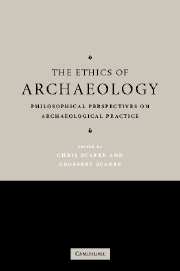Book contents
- Frontmatter
- Contents
- List of contributors
- Acknowledgements
- 1 Introduction
- PART I THE OWNERSHIP OF CULTURAL OBJECTS
- 2 Cultures and the ownership of archaeological finds
- 3 Who guards the guardians?
- 4 Is culture a commodity?
- 5 Moral arguments on subsistence digging
- PART II ARCHAEOLOGISTS AND THE LIVING
- PART III ARCHAEOLOGISTS AND THE DEAD
- PART IV THE COMMON HERITAGE OF HUMANKIND?
- References
- Index
5 - Moral arguments on subsistence digging
Published online by Cambridge University Press: 05 June 2012
- Frontmatter
- Contents
- List of contributors
- Acknowledgements
- 1 Introduction
- PART I THE OWNERSHIP OF CULTURAL OBJECTS
- 2 Cultures and the ownership of archaeological finds
- 3 Who guards the guardians?
- 4 Is culture a commodity?
- 5 Moral arguments on subsistence digging
- PART II ARCHAEOLOGISTS AND THE LIVING
- PART III ARCHAEOLOGISTS AND THE DEAD
- PART IV THE COMMON HERITAGE OF HUMANKIND?
- References
- Index
Summary
The undocumented excavation of archaeological materials for the commercial market, often called ‘looting’ by archaeologists, clearly damages the archaeological record and conflicts with contemporary principles of archaeological ethics. This chapter reflects upon the ethical divide between archaeologists and ‘looters’ with a particular focus on attitudes surrounding one form of undocumented excavation, ‘subsistence digging’. It may upset some archaeologists to discuss subsistence digging so openly, as if doing so gives credence to the activity itself, but I take the stance that everyone concerned with working towards solutions to what is, for archaeology, a troubling dilemma benefits from a closer look at the situation and trying to understand the social, economic and historical standpoints involved.
Practising archaeology in today's world requires dealing with a range of interests, often in the spirit of compromise and negotiation, and a willingness to respect other legitimate points of view. The past certainly does not serve only one purpose or one group of stakeholders (Wilk 1999). Archaeologists are often called upon to balance ethically or to negotiate their own interests and definitions of conservation, significance, stewardship or appropriate management with those of others.
Perhaps more so than anyone, owing to their position of expertise and their claim to be stewards of the archaeological record, archaeologists have an obligation to examine and clarify the philosophical arguments that underlie their attitudes towards subjects such as looting, the commercial use of artefacts, subsistence digging, collecting or other practices, which they deem unethical (Wylie 2003: 5–6).
- Type
- Chapter
- Information
- The Ethics of ArchaeologyPhilosophical Perspectives on Archaeological Practice, pp. 69 - 94Publisher: Cambridge University PressPrint publication year: 2006
- 39
- Cited by

